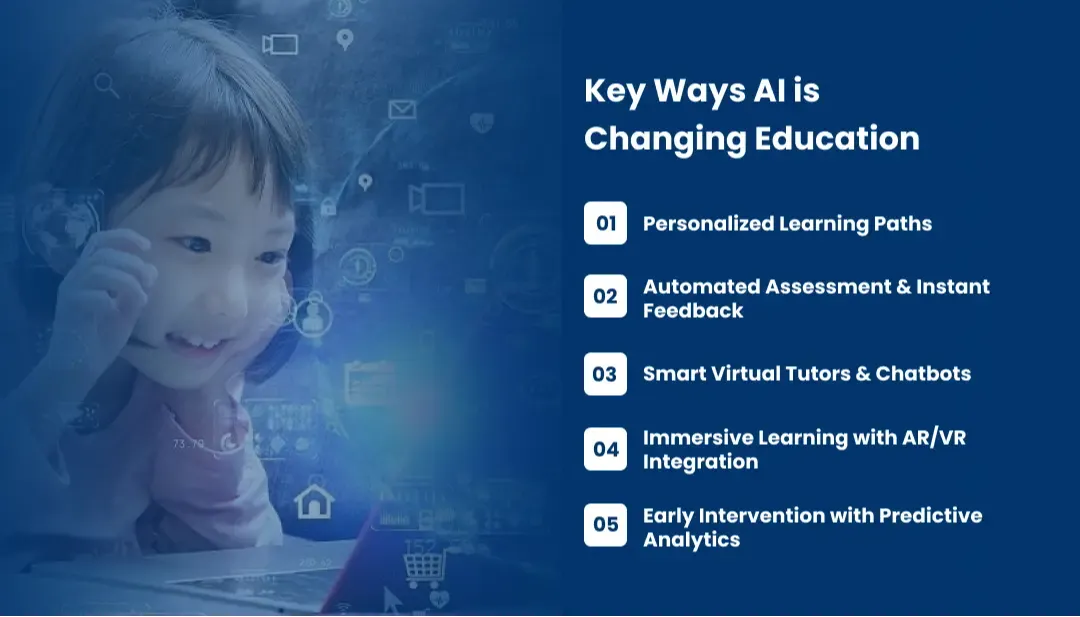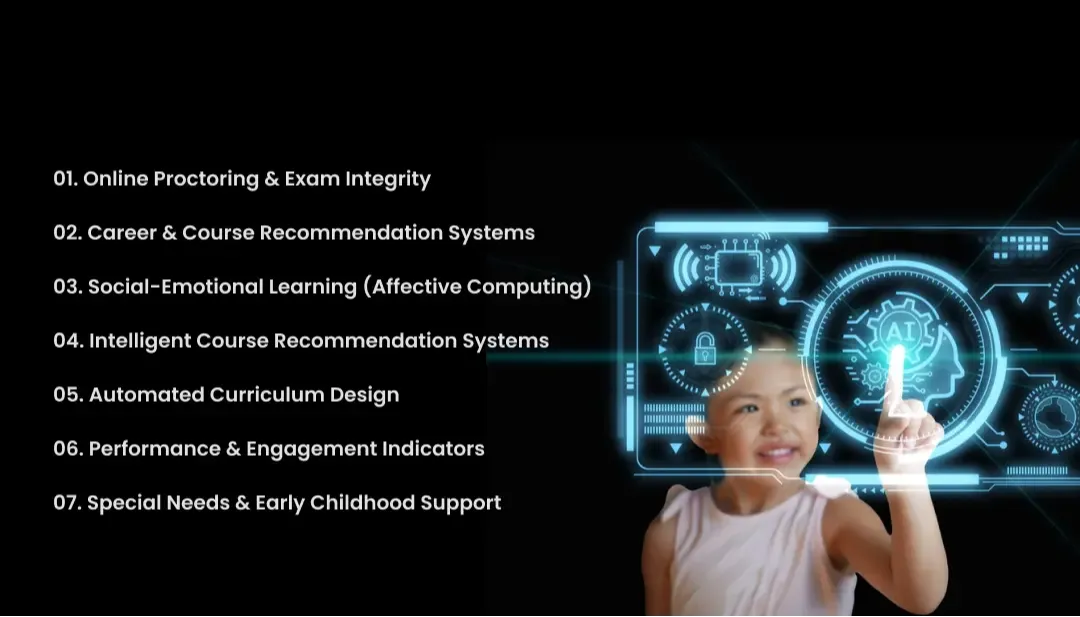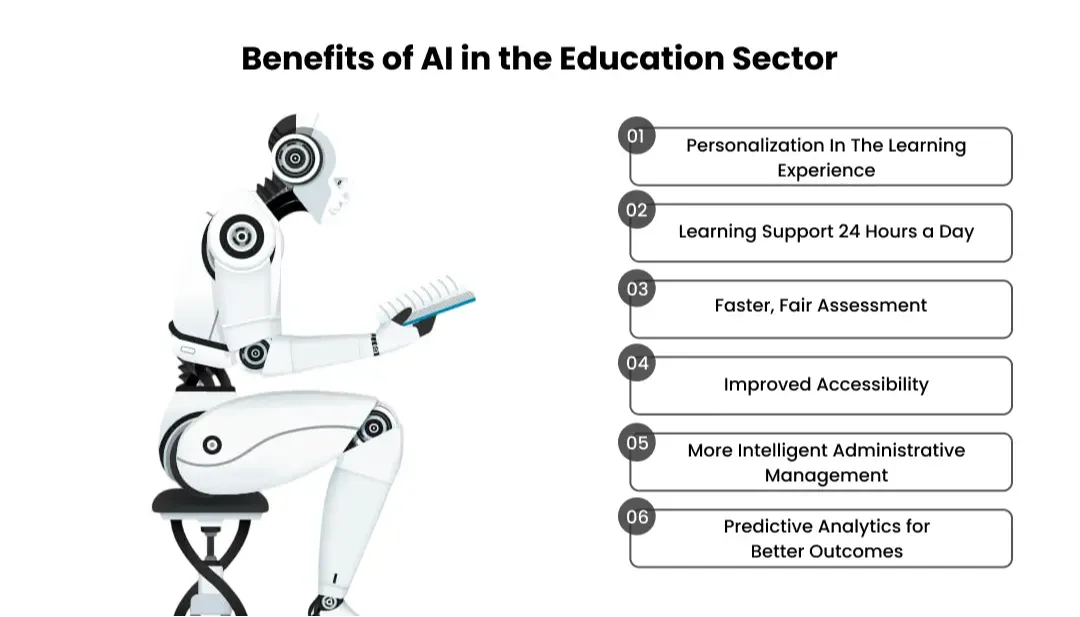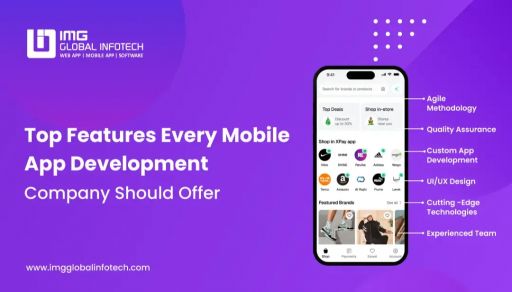How Artificial Intelligence Is Transforming The Education Industry?
Mohit Mittal
Jun 20, 2025

The education industry is now being based on Artificial Intelligence (AI), and students are experiencing smarter, more efficient, and highly personalized pathways to learning. AI is transforming education in various ways, including AI-based tutoring systems, automated grading, AI-driven aspects, and predictive analytics to determine what students need, as well as improved learning methods for students. According to a report by MarketsandMarkets, the size of the Global AI in education market is projected to grow from 4 billion dollars in 2022, estimated to exceed more than 20 billion dollars by 2027, illustrating the expanding shape of AI in education internationally. Education establishments and institutions are also deploying AI technologies to improve student engagement, assist in administrative activities, and support better academic performance.
As the demand for digital learning continues to rise exponentially, more aspects of AI are now needed to drive innovation inclusive, personalized learning, adaptive experiences, and data-oriented approaches like never before in order to enable continuous improvements. In this blog, we will explore some key ways that AI in education is shaping the educational landscape.
Key Ways AI is Changing Education

1. Personalized Learning Paths
AI can deliver personalized learning paths by collecting and analyzing information about each student's performance and modifying what's delivered accordingly - in real time. This can be timely and iterative. For example - if all students are progressing well, not only can the tutor adjust the difficulty of the lesson or the rate of delivery of the content, but using an AI software development like Khan Academy's Khanmigo, students can expect learning in the future to establish personal learning paths related to 'expected experiences,' equivalent assessments and assignments, that account for each learner's requirements for 'what they see, do and understand.
2. Automated Assessment & Instant Feedback
AI in education is a great relief to educators by automating routine activities for teachers, such as reading assignments for grading and assessing academic writing in student essays. There is now, for example, EdChat that can assess how well a student can write in a certain language or how accurate a student's writing is in seconds and provide them instant feedback. This process saves time while also improving student learning. Providing instant feedback not only helps save time by effectively making effective learning interventions at the moment as they are writing.
3. Smart Virtual Tutors & Chatbots
AI virtual assistants really function as a 24/7 tutor of sorts---helping students differentially through assignments, responding to their questions, and supporting students' general academic queries. These AI app development chatbots can also assist educators with more administrative tasks such as scheduling and reminders. On a positive note, the omniscient nature of this technology could disrupt the educational technology space by making students' learning needs more accessible, especially for students in remote and poorly resourced areas.
Also Read - How To Hire AI Developers: A Complete Guide
4. Immersive Learning with AR/VR Integration
ai in education examples is helping to create interactive learning experiences when used together with Augmented Reality and Virtual Reality. Students can actually "go on a field trip virtually," complete science experiments in virtual laboratories, or investigate 3D models of historical events while they are being taught and learning in real time. AR/VR technology is a game changer, championing experiential learning for students.
5. Early Intervention with Predictive Analytics
AI in education now provides educators with notifications regarding student behavior and performance patterns to help educators identify the earliest indications of academic challenges. Educators can use this trend data to follow up with students, warranting intervening as soon as they notice troubling trends. Doing it this way helps teachers to be more preventive, affording students the best chance to get appropriate help when they need it and reducing student dropout rates.
Applications of Artificial Intelligence in Education

If you want to know how AI helps in education, you must know about some of the important applications of AI in education.
1. Online Proctoring & Exam Integrity
In the future of AI in education, academic integrity monitoring systems leverage facial biometric data, behavior analysis, and screen recording to promote integrity during remote assessments. These systems can determine if a pattern typically associated with cheating develops, be aware of suspicious activity in real-time, and notify administrators of incidents all of which help to enable valid, scalable assessments.
2. Career & Course Recommendation Systems
AI is capable of analyzing student performance (grades) along with student interests, strengths in subjects, and job-marketable skill sets to then identify classes, majors, and jobs that would best suit them. AI in education career recommendation systems encompasses much more than assessing academic grades and standards; they provide data-backed suggestions for students, acting as an important bridge to future opportunities. Integrating the 4Cs of mentorship into these systems can further enhance guidance by fostering connection, communication, clarity, and commitment in student development.
3. Social-Emotional Learning (Affective Computing)
Social-Emotional Learning (SEL) AI systems are doing something similar. These emotion-aware AI systems will track students' expressions, tone of voice, engagement levels, and past behavior to inform how they are feeling, whether there is confusion, stress, disconnection, etc. While many AI-based tools assume goodwill and conscientiousness on the part of their user, they can prompt their users' peer group (for instance) to take action by talking to them or even reminding the users about how their prior peers seek to motivate them.
4. Intelligent Course Recommendation Systems
In addition to identifying potential careers, Elearning app development does have the capability of offering dynamically suggested learning modules and supplemental information in the learner's preferred format by considering their past performance and prior-found gaps of knowledge. Using AI in education platforms adds further capabilities by augmenting the definition of the curriculum.
5. Automated Curriculum Design
AI can analyze performance data, levels of proficiency, and learning standards to geographically held-guided maps to create readiness maps or syllabi or even extract content together (video, papers, quizzing). It will allow us to change content considering the needs of our learners.
6. Performance & Engagement Indicators
AI engagement analytics is now available from learning platforms your institution is using, too. These AI-based engagement analytics can assess performance and gather summaries of the time engaged with tasks, participation in the course's forum, and accessing outside resources. Educators gain insight into which materials positively impact engagement to further develop materials in a way that boosts interactivity.
7. Special Needs & Early Childhood Support
This is one of the best examples for the people asking how AI is used in education. AI supports the development of personalized learning plans for early learners and children with disabilities. These online learning platforms allow children to learn foundational skills while providing rich experiences through interactive games, speech and text tools, and even fun word searches that help develop language and problem-solving skills while tracking progress and adapting to each child’s unique learning pace.
Benefits of AI in the Education Sector
Here, you will get the answers on how AI is used in education from 1 to 6 ranking. These are some of the benefits trending in the market.

1. Personalization In The Learning Experience
AI personalizes the educational content that learners engage with by analyzing an individual’s learning style, engagement methods, pace of learning, and performance level. This is one of the key reasons why AI is so important in modern education. Through real-time data analysis, AI adapts content delivery to provide a truly personalized learning experience, ensuring that learners receive the right resources and support based on their capabilities.
When integrated into platforms offering a Generative AI course, this personalization becomes even more impactful. Learners can access tailored explanations, adaptive practice materials, and intelligent feedback that evolve as they progress. This approach often leads to deeper engagement, helping students who may be struggling to catch up without slowing down advanced learners, who can continue exploring content at a faster and more challenging pace.
2. Learning Support 24 Hours a Day
AI-powered chatbots and virtual tutors provide the same learning support around the clock. Whether it's a student concluding their math homework at 12 am and the student needs help to solve a problem, or it's a last-minute study clarification before a big test, machine intelligence edtech can fill in these learning gaps much faster without waiting for a teacher to be available.
3. Faster, Fair Assessment
Using AI in the classroom tools is much faster and is much more fair in grading assignments, quizzes, and even essays.Automated assessments free up valuable time for teachers and provide students with immediate feedback, consistency, and timely responses about how to improve more rapidly from their mistakes.
Also Read - How Much Does It Cost To Develop An AI App?
4. Improved Accessibility
AI solutions for edtech improve the educational processes for students with disabilities. It has features like text-to-speech, speech-to-text, real-time translating, and customizable formats of content that apply to a diverse student cohort (e.g., visual or hearing impairments) and ensures inclusive and equitable learning environments.
5. More Intelligent Administrative Management
AI technology in education is able to automate processes such as taking attendance, scheduling classes, monitoring students' performance, and reporting learning outcomes. Doing so can take some burden off the weight of school staff and roll it off of administrators and teachers as a result, teachers have more time to deliver the educational experiences learners need.
6. Predictive Analytics for Better Outcomes
ai in edtech can use past records and data to highlight trends in students' performance. Another advantage is the ability to specify learners who are likely to become disengaged or will fall further behind. Predictive possibilities allow for fast and effective responses through targeted support practices to improve outcomes and reduce dropout rates.
The Future of AI in Education
1. Generative AI in Personalized Content
Generative AI (e.g., ChatGPT, Jasper, etc.) will be capable of generating quizzes, lesson plans, interactive modules, and even content the decisions toward the content format, such as videos or podcasts specific to what's best for their class without spending days or weeks iterating the custom curriculum.
2. Emotionally Aware Learning (Affective AI)
Advances in this direction will make the Edtech app development learning more sensitive to learners' emotional state, such as recognizing their facial expressions, speech tone, or level of engagement, and generate interventions for the learner like motivational nudges or prompts or students supporting their peers which could lead to improved well-being and retention.
3. Multimodal & Immersive Experiences
AI-enabled multimodal learning - integrating visuals, voice, gestures, and words - will create richer educational experiences. These intelligent systems will provide new immersive experiences that integrate with AR/VR and tactile technologies and create environments that adapt to each learner's chosen modality.
4. AI-Assisted Admissions & Credentialing
Automated AI for educators will process applications for admission and the verification of credentials, conduct entrance interviews, and issue credentials by reviewing applicant documents, audio recordings, and certificates. This will streamline admissions processes, increase fairness, and provide scalability.
5. AI-Powered Collaborative Learning
AI in education will support intelligent collaboration and group formation - screening student goals, strengths, and working styles to identify fellow students for group projects and discussions. It will provide guidance on how to report back to the group through intelligent interactive forums summarizing the dialogue and promoting deeper interaction and engagement.
6. Blockchain-Integrated Academic Credentials
Importance of AI in education, blockchain will create tamper-proof decentralized academic records for everything from diplomas to skill badges that reduce employer disclosure requirements as well as bolster trust in digital credential systems.
Also Read - Top AI Features Powering Next-Gen Mobile App Development
Transform Education with AI-powered solutions from IMG Global InfoTech
Transform your student learning experience with AI in teaching solutions from IMG Global Infotech. Our intelligent systems help personalize student learning paths and automate assessments, track student progress, and provide real-time insights and support to help educators create inclusive and effective instruction. From virtual companion tutors, emotion-sensing apps, and AR/VR content to smart platforms for administrative tasks, we take advantage of the power of the use of AI in education. Whether you're an educational institution, university, or edtech startup, our custom AI solutions will elevate engagement, enhance academic performance, and simplify operations. Work with Edtech app development company to create the future of education, scalable and success-oriented, and together, we can create technology that assists learners and educators in making a difference.
Mohit Mittal is the co-founder of a leading IT company with over a decade of experience in driving digital transformation and innovative tech solutions. With a strong background in software development, Mobile app development, E-commerce, business strategy, and team leadership, Mohit Mittal is passionate about helping businesses scale through technology. When not solving complex tech challenges, he enjoys sharing insights on emerging trends, entrepreneurship, and the future of IT.












